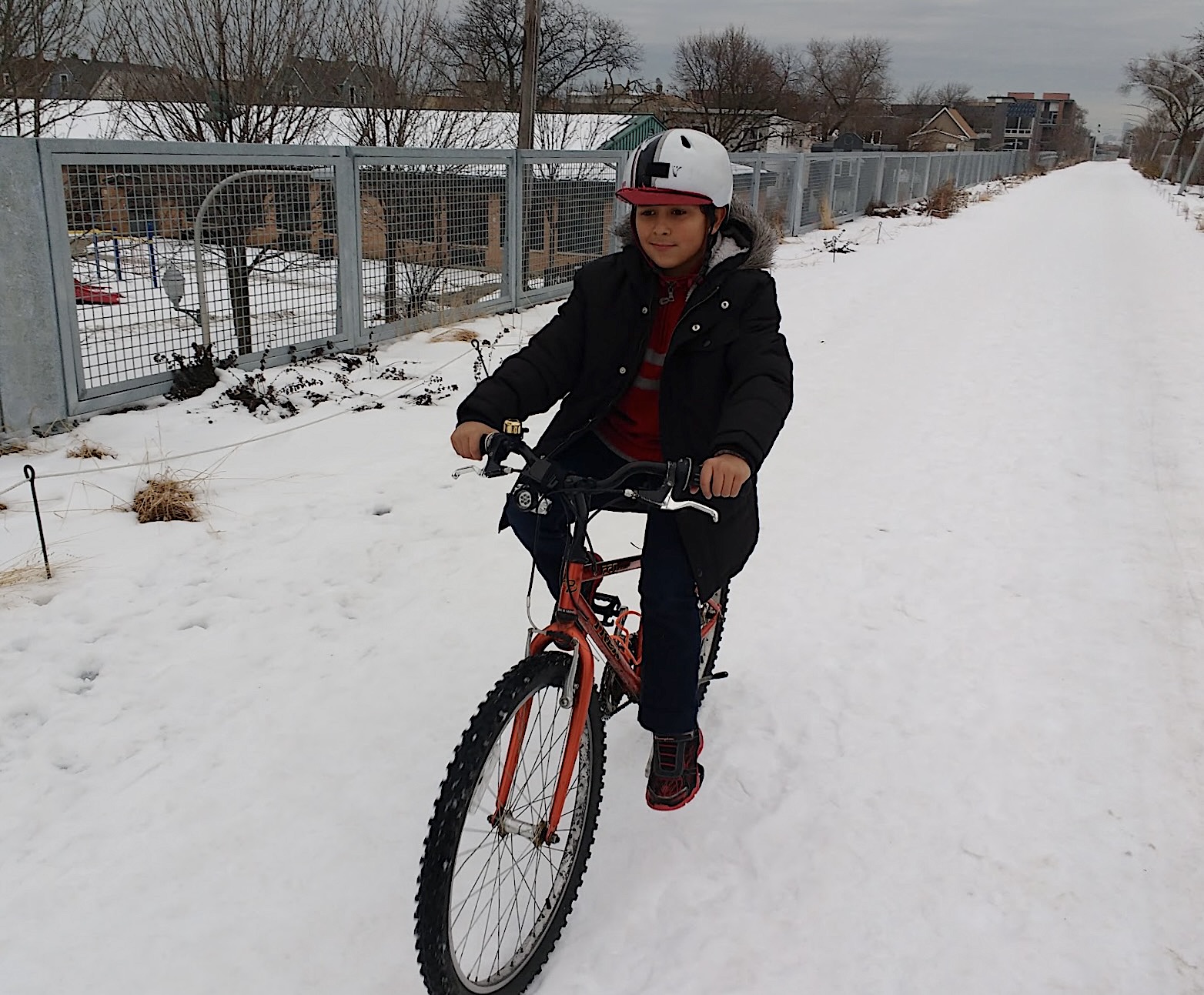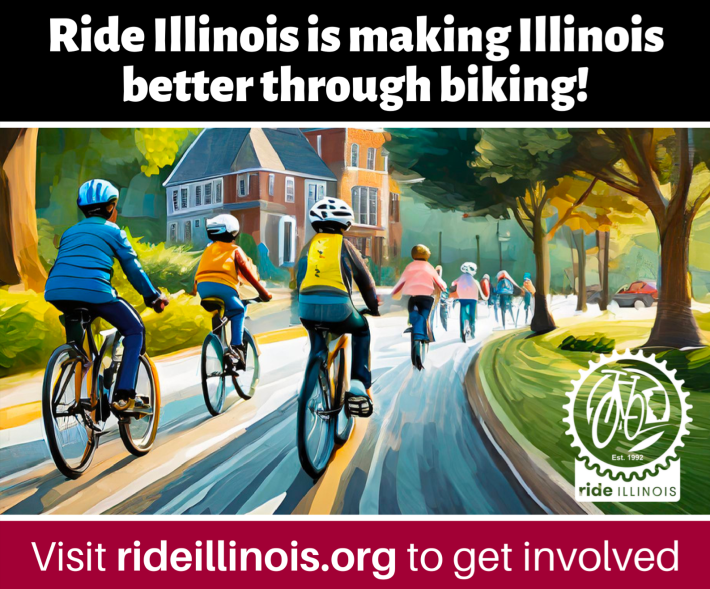
The monthly Chicago Critical Mass bicycle parade/protest/party launched in September 1997. It's been around so long that several people I know from the ride married other Massers and became parents of kids who are now adults. One of them is Quetzal Kilgore, 18, whose mother Gin Kilgore and father Michael Burton met in 1998 at a CCM banner making party.
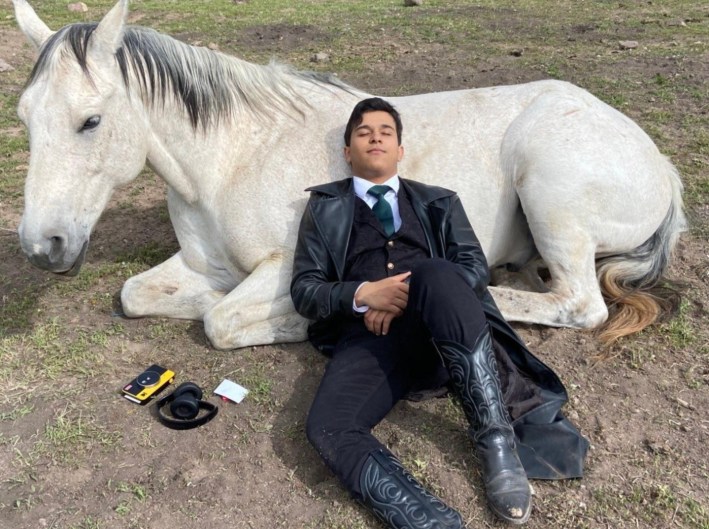
Quetzal, who uses they/them pronouns, grew up in the city's Logan Square neighborhood. Like many of their friends in that community whose parents were also Massers, they lived car-free. I've know Quetzal since they were very young, and I thought it would be interesting to hear what it was like growing up in a family that got around by walking, biking, and transit.
The interview has been edited for clarity and brevity.

John Greenfield: What's your earliest memory of getting around without a car with your family? Do you remember being taken around in a cargo bike or anything?
Quetzal Kilgore: I remember we had this little trailer. It was, I can't remember what color it was or anything, but I remember it had this big, sort of clear plastic front and two wheels on either side. It was like a little chariot. That's kind of how I thought about it at the time.
And so I remember if my parents had to bike somewhere, they would take me there with them in that. And so for the longest time, weirdly enough, that was kind of a safe space for me. It was warm, it was comfortable, a little bit bumpy sometimes, but I could get around. It was my mode of transportation.
I remember that there were plenty of times with struggling to get it hooked up to the bike because I kept trying to help.
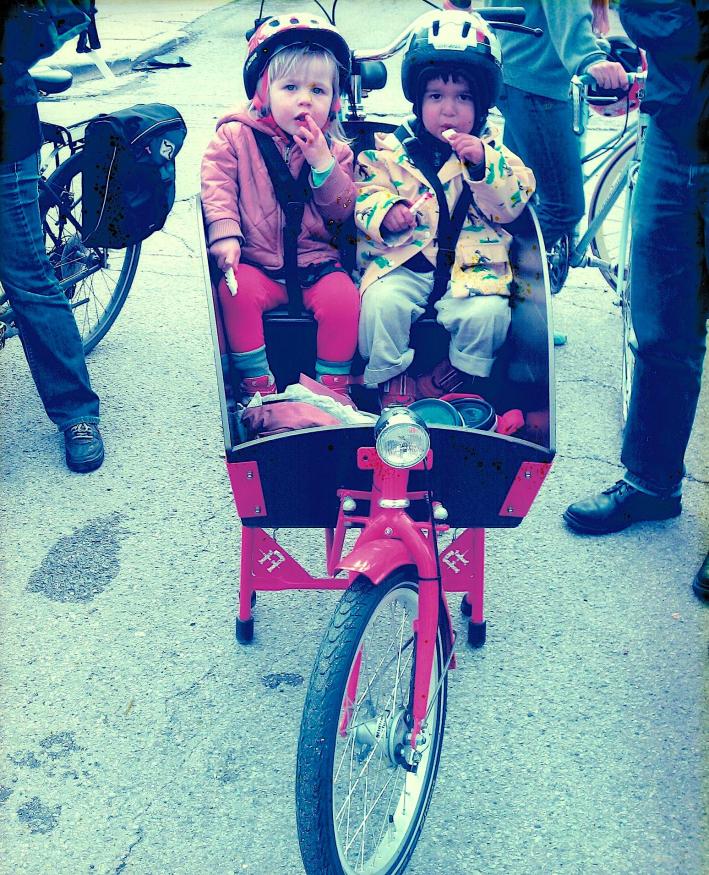
JG: That's funny. Do you remember how old you were when you first started riding bikes? Did you ride a push bike that didn't have any pedals? How did, your family teach you how to ride?
QK: Training wheels. The first time I really remember riding a bike on my own, without someone holding me up, was when we were in the alley behind a friend's house, maybe on Albany Avenue in Logan Square. They had taken the training wheels off. I scooted along. I was super nervous. I was going going and faster, and suddenly I'm like, "Whoa, did I somehow forget to take the training wheels off?" And I look back and they're not there! And then I fell over because I stopped pedaling – I completely froze. I was just so astonished and really proud of myself.
JG: Did you get scraped up?
QK: By that point, I actually had a lot of practice landing, rolling on my back properly. I was also very small. And it's not like I had that far to fall either.
JG: Yeah. So you grew up in Logan Square and a lot of your parents' friends were associated with the Chicago Critical Mass bike ride, which Michael co-founded. So you certainly grew up with a lot of other kids who were in car-free or car-light, families who would get around by bike or have kids in bike trailers. You were probably taking this the CTA a lot too, right?
QK: Yes.
JG: Tell me a little bit about your experiences with transit as a kid.
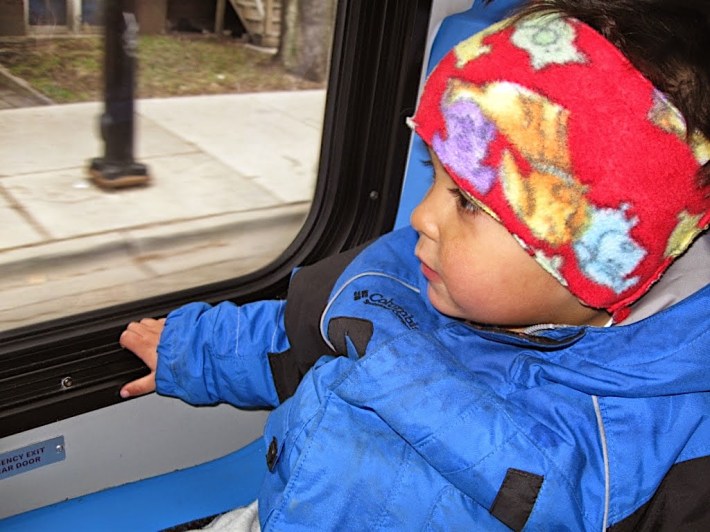
QK: When I was young, I was fascinated by trains and buses. They seemed so big that they shouldn't be able to move the way they did. So I always loved getting onto the train or getting onto the bus. And I have so many memories of standing at a bus station or standing at a train station, looking down the road like, "Is it coming? Is it coming? Is it coming?" And to this day, I still do that to a degree. They're still really fascinating to me.
But I remember very distinctly when I was younger, it was a really big thing for me, even if we did it relatively frequently, the rumble of the train coming down the tunnel in some of the underground lines was just kind of one of my favorite sounds.
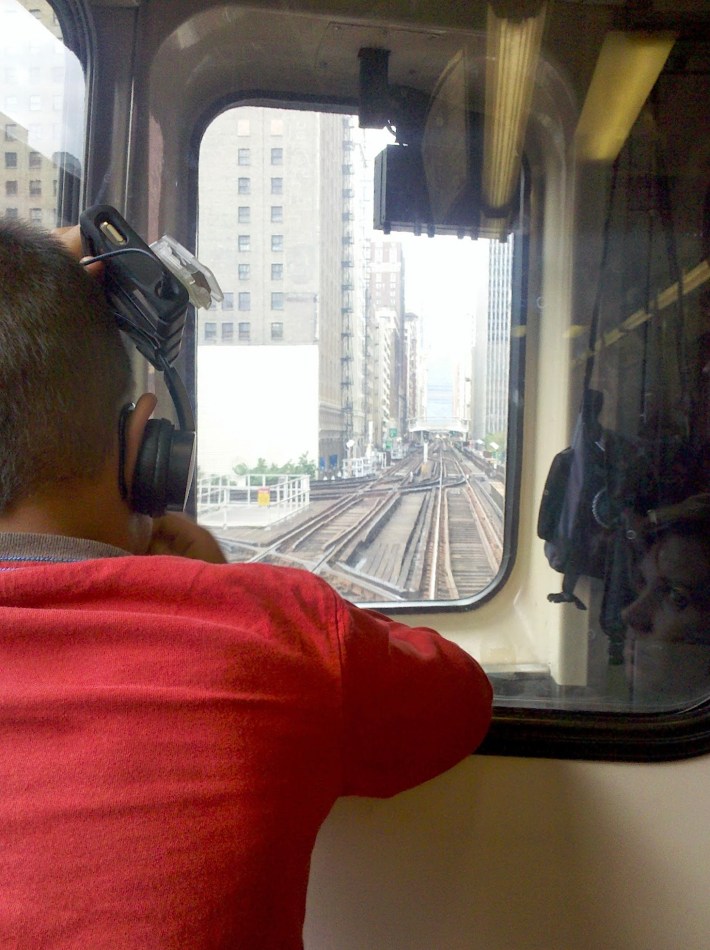
And so I remember... The CTA has, does have its issues, and I'm more aware of that now than I was then. But it was never one of those places where you would go on and you'd feel terrified. It was more of like, just stick with people you know, and you'll be fine. I loved it so much.
Most of the time, people on the CTA are great. I remember this one time when I was very young. It was one of those really early memories. And there was a guy who got onto the train. He was acting a little bit rowdy, and he sort of started coming in my parents and my general direction, obviously not with malicious intent. I think he was just a little drunk. But other passengers just got between me, a small child at the time, and him, and once he went past and went all the way back, they turned around and asked if we were okay.
JG: That was nice of them.
QK: Yeah. I really love the environment of the CTA, because most of the people are just there doing their best.
JG: Right, did your family ever take Metra with bikes to go on camping trips or things like that?
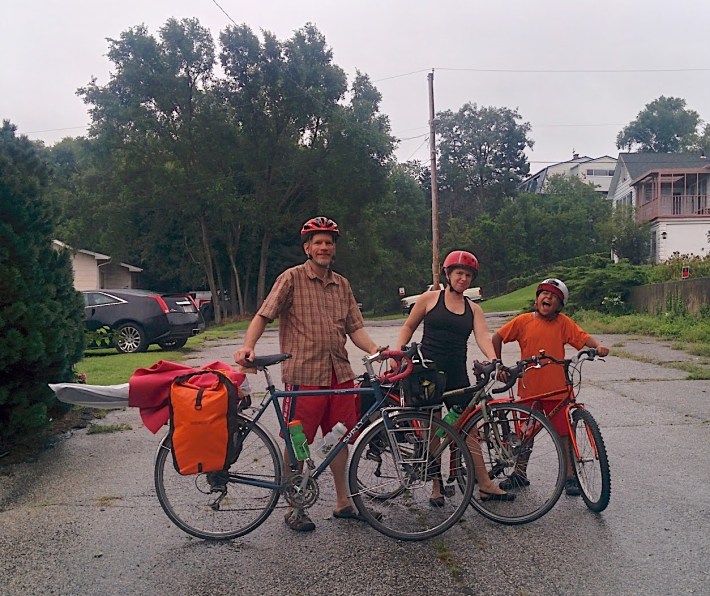
QK: Occasionally, we did. I believe my biggest memories of taking Metra anywhere were when we would go to Miller Beach in Indiana during spring break. And most of the times we would bike from Chicago to Indiana with a large group of people. Recently, some photos of that actually popped up in them on my phone, so that was nice.
But once or twice we took Metra there, and I remember just being sort of astonished at how fast and how far we were going. And, like, logically, I knew the size of the world is the world's massive. When I was very young, my parents and I took a trip to Ecuador. So, I knew the world was big. But it's one thing going in a plane and falling asleep and waking up somewhere else, and it's another thing having your face pressed against the window of a speeding train car, watching the cities and towns that fly by.

JG: OK. Growing up in Logan Square, did you get in the habit of riding bikes around with with other kids?
QK: Yeah, whenever we wanted to go somewhere that was outside of, that was outside of walking distance, but still relatively in the general area, we would bike there.
Our families would do something called "Kid Chaos." A bunch of kids would come over, and occasionally the parents would let us out, and we'd be able to bike around the block a few times. It was just really exciting because we were doing things on our own.
JG: How old were you then?
QK: It went up from some of my earliest memories of a kid until 10 or 11, maybe even a little older.
JG: So as a teen, how did biking play into your life then? Or using transit?
QK: Biking and transit just gives you the freedom to really go anywhere in the city. For a lot of people, when you grow up, your parents have cars. There's a good mix of time where you don't want your parents to drop you off, but you have to, because you don't have your own car. I never had that. If I wanted to go somewhere, the only issue would be getting my parents permission. So it gave me a lot of freedom.
JG: What were some of the destinations that you biked or took transit to back then?
QK: Some things as simple as going to and from school on my own were really nice. Other things, such as going over to a friend's house, or there's a cool restaurant I want to go to. Sometimes we'd just go into a park. There's this little Italian Ice place near Palmer Square. I liked biking there.
JG: All right. Now, although your family has been car-free most of your life, there was a time when your parents bought a camper van or something. So there was a period when you had a motor vehicle. How do you think that worked out?
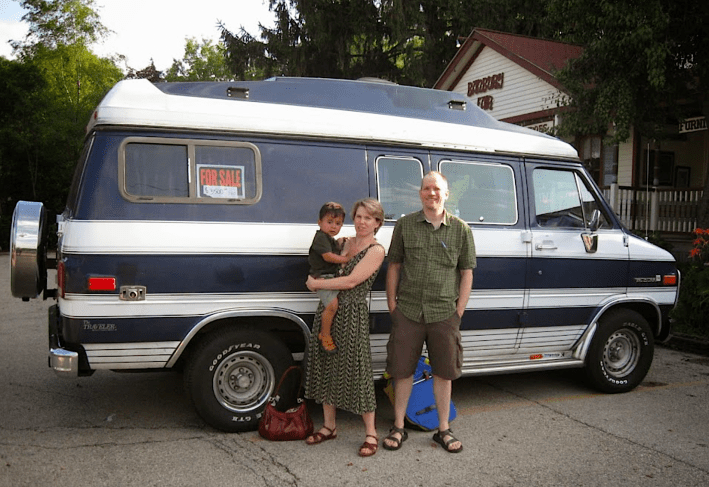
QK: Well, here's the thing. It was, it was old, it was rusting, and it was leaking water from the roof, four or five times. It was not great.
My memories of it are very vague. I remember it had these really nice blue curtains on the inside at some point, and I think we sold them, or we had to get rid of them or something, because they got water damage. Yeah, it was not my favorite experience, that car.
JG: So that was sort of the exception to the rule that you generally lived a car-free childhood. You've told me a lot of the advantages. To be fair, were there any downsides of growing up without a car?
QK: Yes, sometimes when the weather gets really bad, you really don't want to be biking or walking to a train station, especially on your way to and from school and other places. Because it kind of sucks to have everyone else show up, warm and dry, and you show up looking like a recently bathed cat. [Laughs.]
JG: Did did your life change at all when ride-hail started coming into fashion, like Uber and Lyft – did your family use that much?
QK: Not really. We used it to get to and from the airport, but anything we used Uber and Lyft for, we would have used a taxi for back in the day, so really nothing changed to go ahead and use it regularly. We didn't go out of our way to try to get a lift instead of biking.
JG: OK. So I thought your line about showing up at school looking like a wet cat was really funny. Did you ever learn techniques for staying warm and comfortable while commuting by bike or transit?
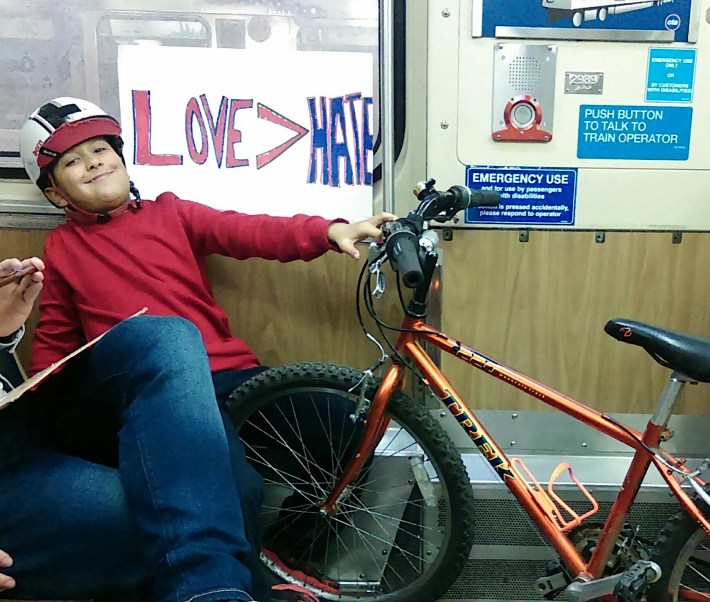
QK: Yeah, it really just goes to layering properly. Remember to wear a rain jacket and rain pants, accept the fact that eventually you're gonna get at least a little bit wet. But if you're careful, you're not gonna, as I said, look like a drowned cat.
But one of the downsides for me is that I'm really temperature sensitive. I get hot really, really easily. So this is more of a personal thing. I would have to choose between, am I going to be sweaty when I get to school, or am I going to be soaking wet? More often I choose soaking wet.
JG: I understand. All right, lots of great information. Is there anything else you want to tell me?
QK: One more thing. A lot of people are going to say that it's dangerous to bike with a small child, like, "Why would you let a child bike on the street, near the street, or on their own?"
Statistically, that's really not true. Statistically, the most dangerous way to travel is by car. So anyone who makes the argument of, "Why would you let a child bike near the streets?" really should be questioning, "Why do we think biking is dangerous, when we regularly put children in two-ton metal death traps?"
JG: All right. Well, this is great: You had lots of interesting stuff to say!

Did you appreciate this post? Streetsblog Chicago is currently fundraising to help cover our 2025-26 budget. If you appreciate our reporting and advocacy on local sustainable transportation issues, please consider making a tax-deductible donation here. Thank you!
